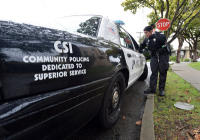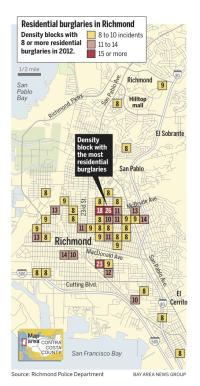| |
Richmond police turn attention to stemming property crime
By Robert Rogers
Contra Costa Times
Posted: 03/01/2013 04:11:21 PM PST
Updated: 03/01/2013 10:37:46 PM PST
Click photo to enlarge

Richmond Police Officer Giulia Colbacchini talks with a fellow officer after responding to a...
RICHMOND -- Bloodshed commands the attention, but the average Richmond resident is far more likely to have his house or car burglarized than fall victim to street violence.
With the long-standing problem of violent crime on a multiyear retreat, Richmond police leaders are turning their attention to more common problems: nonviolent car thefts and household burglaries.
"There was a time when we just didn't have the resources to do much with these property crimes," Richmond police Chief Chris Magnus said. "And that perception persists, but we want to let the community know there is a new mindset, that property crimes are a priority, too."
While homicides have plunged -- last year's total of 18 was one of Richmond's lowest on record -- nonviolent property crime remains persistently high. A total of 1,153 residential burglaries were reported in Richmond last year, an average of more than three every day, with concentrations highest in the neighborhood north of Macdonald Avenue, between 23rd Street and San Pablo Avenue.
In 16 square-block sectors of the city, more than 10 burglaries were reported last year. At the same time, Richmond recorded 577 auto burglaries and 1,884 stolen cars, both big spikes over 2011.
But Magnus said high property crime will not go unchecked.
"We are in a better position now to deal with this," Magnus said.
Residents in other area cities with departments strained for resources report burglaries online, a common practice in Oakland, where calls about a burglary not in progress routinely wait hours before police can arrive.
In Concord and Antioch, which have less crime, officers will come out to reports of burglaries, but residents have the online option as well.
Magnus cringes at the idea of the online report in lieu of an officer at the crime scene. More than a year ago, the department stopped offering the online reporting feature for property crimes, in part to send a message that the department wants people to call dispatch, Magnus said.
"People need to know we will respond and we do catch people," Magnus said, adding that five suspected burglars were nabbed in December thanks to calls from watchful neighbors.
During a recent round-table discussion with top command staff and crime-prevention manager Michelle Milam, Magnus said he plans to pivot resources toward reducing nonviolent, quality-of-life crimes.
The strategy is simple but multipart: Prompt response to nonviolent crimes, neighborhood network building and educating residents about how to make their homes and cars less vulnerable to thieves.
"Part of our job is to get people aware and involved," Milam said.

"Everyday residents can really make a difference in these crimes by just taking a few simple steps and being conscientious."
Last year, Richmond police gave more than 150 community presentations on crime-prevention tactics to neighborhood groups and businesses. Milam also holds monthly crime-prevention classes for neighborhood block captains, and Richmond Police Explorers join officers to canvass neighborhoods and share literature with tips on how to bolster home defenses.
Myrtle Braxton, president of the Laurel Park Neighborhood Council, said the city's community policing approach has made a difference.
"There's a positive police presence in our neighborhood, and it's a cooperative one because the neighbors know our regular beat officers and are willing to share with them and call on them," Braxton said. "Then the police come to our meetings and share information with us, about crime, how to protect your home."
One of the flash points of the city's effort to curb property crimes will be in the North and East Neighborhood, police officials agree.
While the North and East has an active neighborhood association and an email network numbering in the hundreds, it is also dense with older housing stock and a high percentage of new residents and non-English speakers. The rapidly changing population is a challenge, police say, because fewer neighbors know each other and young, working-class families may not see home security as a top priority in their hectic, paycheck-to-paycheck lives.
The combination makes for a fertile ground of "soft targets" for burglars, said Captain Manjit Sappal, who oversees the city's northern district.
"There has been some neighborhood destabilization due to foreclosures, and we've seen an almost exponential increase in (residential burglaries) the last few years," Sappal said.
Sappal said the goal this year is to "harden targets," meaning encouraging residents to bolster home defenses and improve community awareness and interconnectedness.
"Very simple measures like having a home alarm, good locks on doors, motion sensor lights and trimmed bushes make a tremendous difference" in the likelihood that a house will be targeted, Sappal said. "(Burglars) look for the easy ones."
Police leaders changed department protocol on home burglaries last year.
Before, an officer would respond and gather information regarding the burglary, and may or may not knock on doors looking for witnesses.
Now, Sappal said, officers always canvas the neighborhood for clues and witnesses, and pass out bilingual bulletins alerting neighbors that a burglary has been committed and giving tips on how to protect themselves.
"The idea is to raise awareness on target hardening and being vigilant about reporting suspicious behavior," Sappal said.
Magnus said it's crucial that the public believes the department takes property crimes seriously.
"There's a mindset, and it's understandable, that there is no point in calling police for some of these crimes, that they're just not important," Magnus said. "I still hear that from people."
Officers respond to residential or auto burglaries either via 911 calls or through the city's anonymous tip line. When they arrive at the scene, officers are careful not to implicate anyone who called the police but may fear reprisal for doing so.
"Even though it is rarely something to fear, we understand people's requests for anonymity," Magnus said. Police also take the new step of passing out fliers in the immediate neighborhood, alerting neighbors that a burglary occurred nearby.
Richmond police ask that residents share anonymous information at 510-232-TIPS (8477).
Staff writers Harry Harris, Paul Burgarino and David DeBolt contributed to this report. Contact Robert Rogers at 510-262-2726 and follow him at Twitter.com/roberthrogers.
CRIME PREVENTION TIPS
Here is a Richmond Police Department checklist of basic measures you can take to reduce your chances of being burglarized:
Home tips
· Doors are solid hardwood or metal-clad.
· Doors feature wide-angle peepholes at heights everyone can use.
· If there are glass panels in or near doors, they are reinforced in some way so they cannot be shattered.
· All entryways have a working, keyed entry lock and sturdy deadbolt lock installed into the frame of the door.
· Spare keys are kept with a trusted neighbor, not under a doormat or planter, on a ledge or in the mailbox.
· Shrubs and bushes are trimmed so there is no place for someone to hide.
· There are no dark areas around the house, garage or yard at night that would hide prowlers.
· Every outside door has a bright, working light to illuminate visitors.
· Outdoor lights are on in the evening -- whether someone is at home or not, or a photocell or motion-sensitive lighting system has been installed.
· The door leading from the attached garage to the house is solid wood or metal-clad and protected with a quality keyed door lock and deadbolt.
· The overhead garage door has a lock so as not to rely solely on the automatic door to provide security.
· All garage doors are locked when leaving the house.
Vehicle tips
· Lock your car and take your keys with you even when parked in your driveway. An unlocked car is an easy target for a thief.
· Park in a well-lighted, well-traveled area, close to a corner with foot traffic. Completely close your windows and sunroofs, even when leaving your vehicle for a short time.
· If your vehicle is parked in front of your house, consider installing a light with a motion detection sensor. Replace knob or "T" shaped door lock buttons with tapered ones.
· Consider etching your driver's license number, or a personal identifier, discreetly on any car parts or accessories that might be taken by a thief so it can be returned to you if recovered.
· Ensure you have a locking gas cap.
· Be careful not to leave valuables such as purses, wallets, CDs, iPods, cellphones, laptops, or other expensive items in you car in plain view. If you do not want it stolen, take it with you.
· Consider anti-theft devices such as "the club" for commonly stolen vehicles such as 1991 Honda Accord, 1990-1995 Honda Civic, 1989 Toyota Camry, 1994 Nissan Sentra, 1990 Acura Integra, 1986 Toyota Pickup, 1993 Saturn SL, 1987 Toyota Corolla, 1990 Chevrolet Full Size C/K 1500 Pickup, 1997 Ford F150 Series.
· Activate any theft-deterrent device you may have such as car alarms, mechanical locking devices and ignition cut offs and wheel locks. Many people have these devices, but it is important to use them consistently. Consider theft-protection devices for car radios and rims.
· If you have access to a garage, use it. If you share a carport or communal garage, meet with your neighbors and your property manager to discuss strategies improving vehicle safety.
· Do not leave your license, wallet, spare keys, Social Security card, vehicle registration, car title, proof of insurance, bills, or anything with your address unattended in your car. Although it is required that you carry some of these items when operating a motor vehicle, it is recommended that you carry these on your person, rather than in your glove compartment. A thief can use the information in your car to sell it, or assume your identity.
If you have further questions about this and other safety tips, call the Richmond Crime Prevention Unit at 510-620-6538.
|
|

